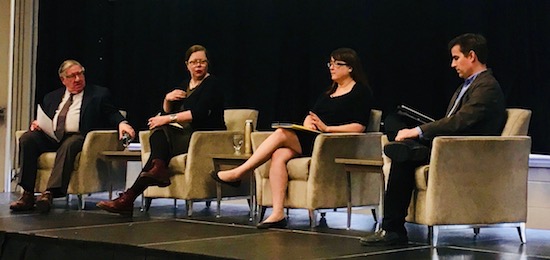—Bryan Tolson, FAUW President
I want to thank everyone who attended the President’s Luncheon on Academic Freedom last week. For those who missed it, there was a summary in the Daily Bulletin last Friday and I’ve highlighted some key takeaways below. It was a compelling discussion with insightful questions from all, so thank you again to all who participated.
It’s clear that academic freedom is important to our members. It’s also clear that it’s a complicated issue, and I look forward to further discussion. Here are a few points from this event that I think are worth highlighting.
What academic freedom is
We need clarity on what academic freedom actually is. Our vice president and one of the other panelists, Shannon Dea, who has been researching and blogging daily about academic freedom, provided the following definition:
Academic freedom is a distinctive class of freedoms possessed by scholarly personnel of certain types of educational and research institutions by virtue of the social role that they fulfil. It’s an umbrella term for a number of freedoms, including the freedom to design lines of inquiry, choose research topics, design methodologies, teach as our expertise guides us. Students have the freedom to learn as their conscience and curiosity guides them. Freedom of expression—often conflated with academic freedom—comes only at the end.
Many University statements and policies on academic freedom, including Waterloo’s, also establish accompanying responsibilities. At Waterloo, those with academic freedom are required to exercise it responsibly, ethically, and in a way that is just.
 |
| Left to right: moderator VP Academic & Provost George Dixon, Professor Shannon Dea, University Secretary Karen Jack, FAUW President and Professor Bryan Tolson |
Who has academic freedom
Waterloo is unique in that we have policy (Policy 33—Ethical Behaviour) providing academic freedom to “all members of the University community.” This includes students, who have the right to study and put forward lines of inquiry that are not popular.
The role of tenure
Tenure is an important tool for protecting academic freedom, but it’s not the only one. All faculty represented by FAUW enjoy the same level of academic freedom under our Memorandum of Agreement with the University and all instructors are also protected by the academic freedom clauses in Policy 33. Nonetheless, I do believe that tenure provides faculty members the confidence to fully exercise their academic freedom.
FAUW has and will continue to fight for your academic freedom regardless of your job title, tenure status or permanence. If you feel that we can do more to protect your academic freedom, let us know.
Read more: Since the event, Dea has been examining the scope of academic freedom for both tenured and the wide range of untenured scholars on her blog.
Protecting academic freedom at Waterloo
FAUW is here to defend your academic freedom. The University is committed to protecting your academic freedom. But when there are violations—and we know there are, even today —FAUW is here to help. Contact our Academic Freedom and Tenure Committee if you feel your academic freedom has been violated.
Next steps
I look forward to participating in a follow-up event where we can continue to address the questions you all have. If you have ideas for such an event or if you have a question you’d like FAUW or University administrators to answer, please share them in the comments below, or email Laura McDonald or Kelly McManus.
On April 5, following our Spring General Meeting, FAUW will be livestreaming the 2018 Worldviews Lecture, “Free speech on campus: Challenges for minority rights and democratic values” with featured speaker Sigal Ben-Porath. The livestream runs from 1:30–4:00 p.m. in QNC 2502. The General Meeting begins at 11:30.